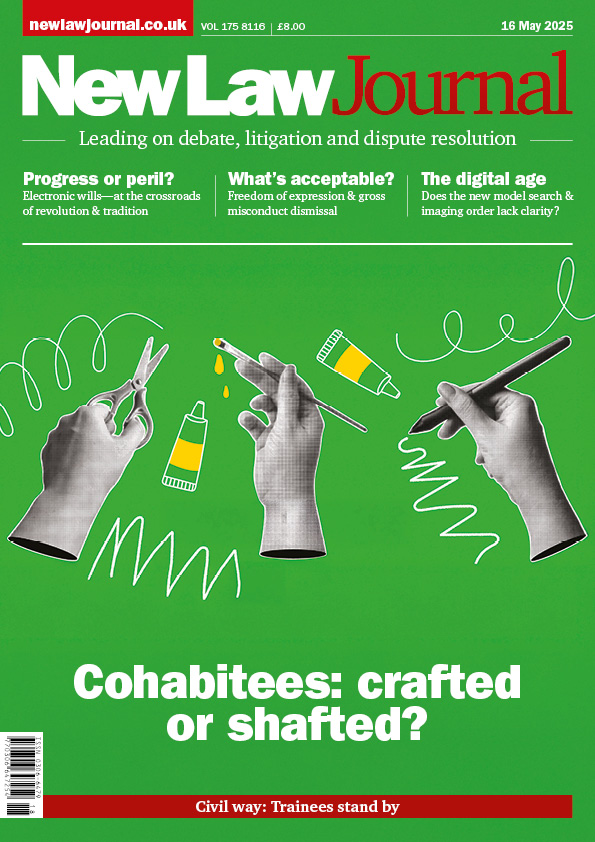THIS ISSUE

Law reform to give more rights to cohabiting couples has been on the campaign agenda for a long time, but is a blanket approach best? In this week’s NLJ, Caroline Bowden, consultant at Anthony Gold, looks at the difference between couples who have chosen not to legally regulate their relationship, and those where one partner has economic power and the other does not.
We need robust new legislation to tackle the online advertising of prostitution, writes Lesley Manley
Most documentary evidence is in digital format, mainly stored in cloud-based platforms, but is the new model search and imaging order, which came into force in April, fit for purpose? In this week’s NLJ, Mary Young, partner, Kingsley Napley, considers this question in depth.
A waste of time or due process? Neil Parpworth reports on the Lords debating the Lords
Caroline Bowden sets out the need for cohabitation reform—for some couples but not others
The new model search & imaging order lacks the clarity needed for the digital age, argues Mary Young
Whistleblowing protection is inching forward with judicial help, writes Charles Pigott—but reform is still needed
Could we soon be tapping out wills on our phones, ask Brendan Udokoro & Kiera Quinn
Electronic wills—inevitable in a digital era, or an abomination liable to wreak fraudulent chaos? In this week’s NLJ, Brendan Udokoro, associate, and Kiera Quinn, associate (New Zealand qualified), Howard Kennedy, examine the pros and cons, risks and rewards of allowing people to tap out their will on their phone or laptop.
MOVERS & SHAKERS

Keystone Law—Milena Szuniewicz-Wenzel & Ian Hopkinson
International arbitration team strengthened by double partner hire

Coodes Solicitors—Pam Johns, Rachel Pearce & Bradley Kaine
Firm celebrates trio holding senior regional law society and junior lawyers division roles

Michelman Robinson—Sukhi Kaler
Partner joins commercial and business litigation team in London
NEWS
The Legal Action Group (LAG)—the UK charity dedicated to advancing access to justice—has unveiled its calendar of training courses, seminars and conferences designed to support lawyers, advisers and other legal professionals in tackling key areas of public interest law
The Police and Criminal Evidence Act 1984 transformed criminal justice. Writing in NLJ this week, Ed Cape of UWE and Matthew Hardcastle and Sandra Paul of Kingsley Napley trace its ‘seismic impact’
Operational resilience is no longer optional. Writing in NLJ this week, Emma Radmore and Michael Lewis of Womble Bond Dickinson explain how UK regulators expect firms to identify ‘important business services’ that could cause ‘intolerable levels of harm’ if disrupted
As the drip-feed of Epstein disclosures fuels ‘collateral damage’, the rush to cry misconduct in public office may be premature. Writing in NLJ this week, David Locke of Hill Dickinson warns that the offence is no catch-all for political embarrassment. It demands a ‘grave departure’ from proper standards, an ‘abuse of the public’s trust’ and conduct ‘sufficiently serious to warrant criminal punishment’
Employment law is shifting at the margins. In his latest Employment Law Brief for NLJ this week, Ian Smith of Norwich Law School examines a Court of Appeal ruling confirming that volunteers are not a special legal species and may qualify as ‘workers’







